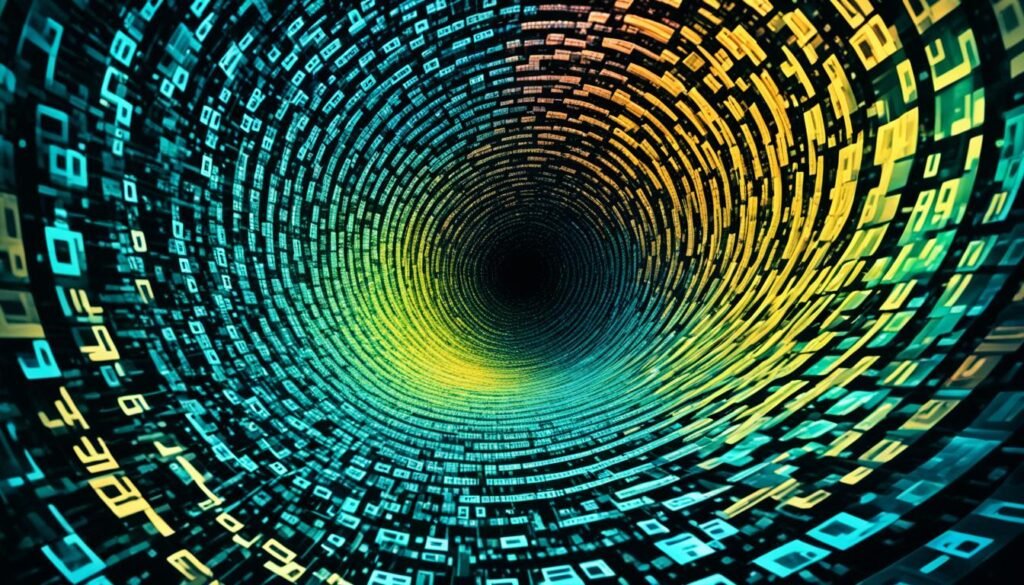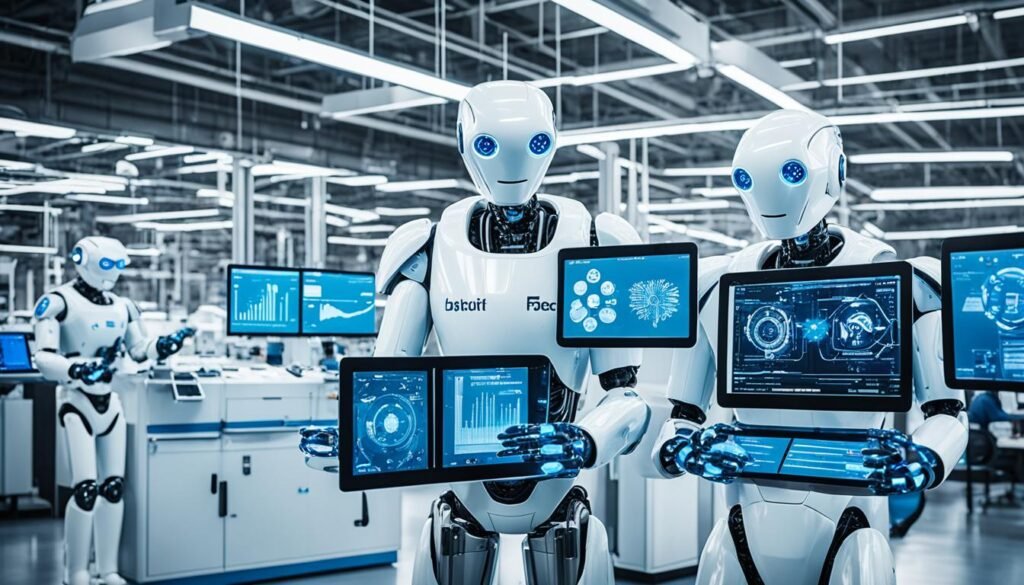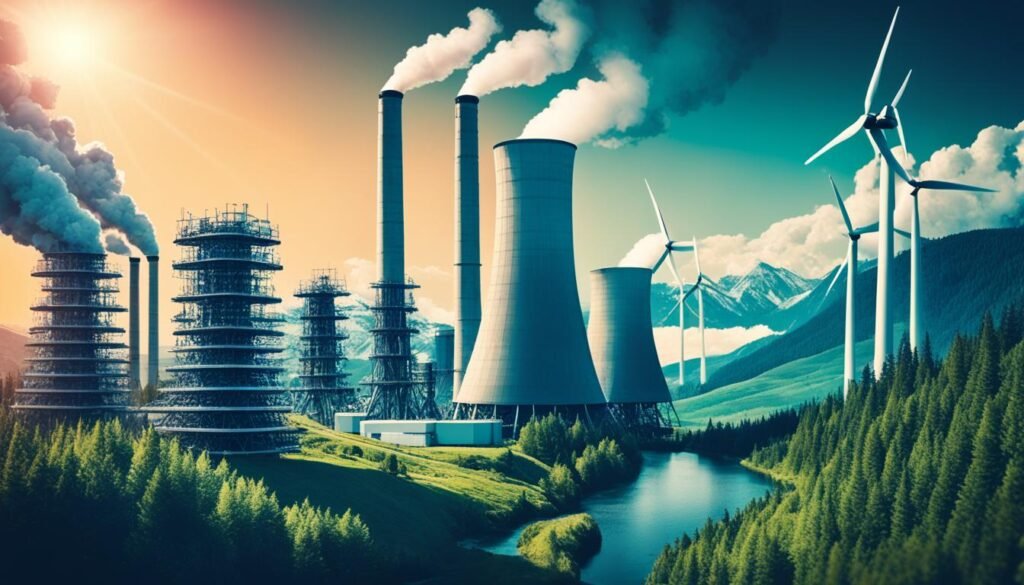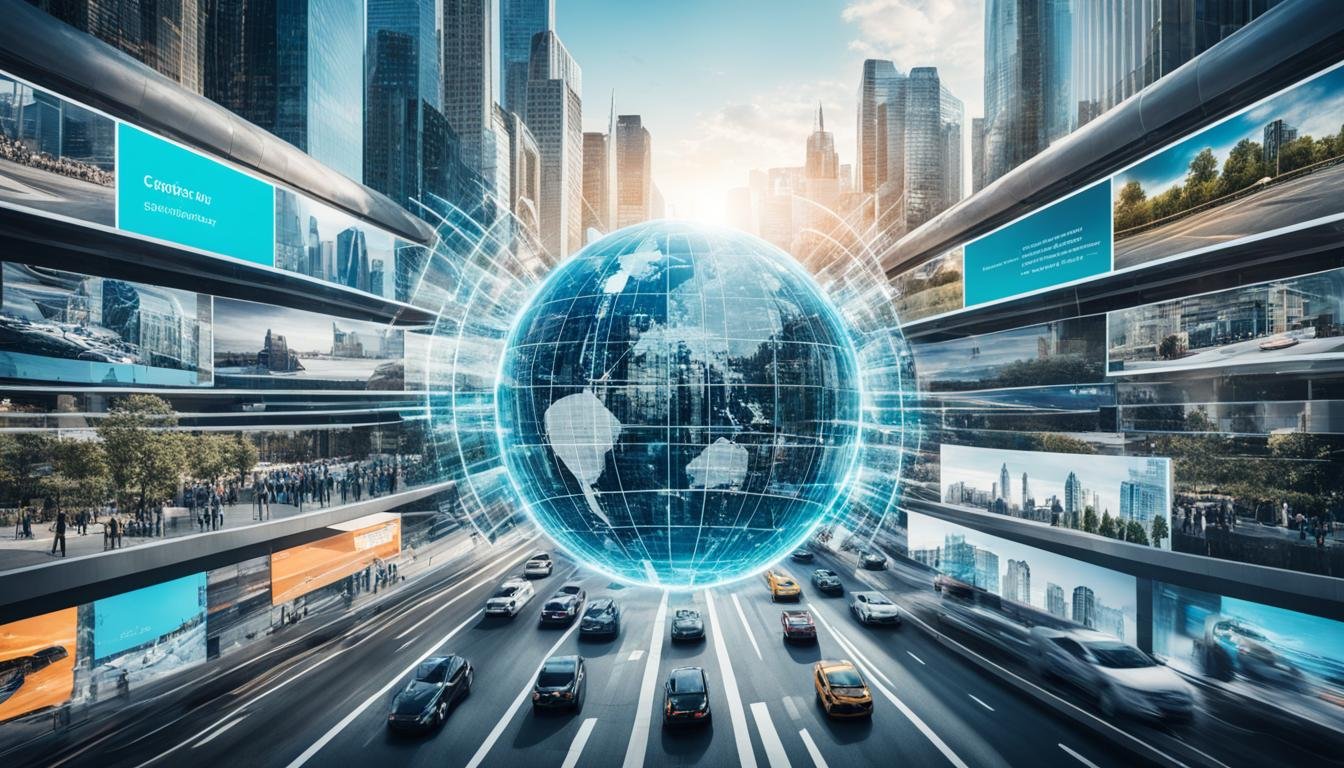Artificial intelligence (AI) is now a key player in our lives, not just in movies and books. A 2023 IBM survey found that 42 percent of big companies use AI, and 40 percent are thinking about it. Generative AI is also gaining ground, with 38 percent of companies using it and 42 percent planning to.
AI is changing the world in big ways. It’s making a mark in healthcare, finance, education, and more. It’s also leading to new discoveries in tech and security. This article will look at how AI is shaping our future, including the trends and changes we’ll see.
Key Takeaways
- AI integration is rapidly accelerating, with 42% of enterprises already using it and 40% considering it.
- Generative AI has expanded the possibilities and popularity of AI, with 38% of organizations implementing it.
- AI is revolutionizing industries like healthcare, finance, education, media, and technology.
- The transformative power of AI is expected to shape the future in profound and far-reaching ways.
- Understanding the trends, disruptions, and transformations driven by AI is crucial for navigating the years ahead.
The Rapid Evolution of AI
The journey of artificial intelligence (AI) has been amazing, filled with big steps forward. It started in the 1950s with Christopher Strachey’s first AI program. Now, we have generative AI, changing how we use technology.
Machine learning and deep learning have led to huge achievements. In 1997, IBM’s Deep Blue beat chess grandmaster Garry Kasparov. Then, in 2011, IBM’s Watson won on the TV quiz show Jeopardy!, showing off its language skills.
Generative AI Takes Center Stage
Generative AI is the newest big thing in AI, led by OpenAI’s GPT models. GPT-3 in 2020 had 175 billion parameters, a big step in understanding and creating language. This led to GPT-4 and ChatGPT, making AI generators for text, audio, images, and more.
Generative AI has amazed people and changed many industries. 38% of organizations now use generative AI, and 42% are thinking about it. The future of AI looks even more exciting with more breakthroughs on the way.

“The development of full artificial intelligence could spell the end of the human race….It would take off on its own, and re-design itself at an ever-increasing rate. Humans, who are limited by slow biological evolution, couldn’t compete, and would be superseded.”
– Stephen Hawking
Business Automation and Job Disruption
As more companies use artificial intelligence (AI), they’re turning to AI for automation. About 55% of businesses now use AI in some way. This shows a big move towards using smart automation soon.
AI is changing work by using chatbots and digital assistants. These tools can answer simple questions and help employees, so people can focus on harder tasks. AI also quickly analyzes lots of data to help make decisions, making businesses run smoother.
| AI Adoption in Businesses | Impact on Employment |
|---|---|
|
|
The growth of ai business automation has raised worries about job losses. Many think AI could take over nearly one-third of their work. AI’s effect on jobs varies by industry and job type, but there’s a big need for skills in machine learning.
“The historical impact of automation on American manufacturing has led to a decline in jobs and increased inequality over four decades.”
The ongoing ai impact on employment shows we’re facing big changes in the workforce. To keep up, people will need new skills. Governments and leaders must work together to make sure AI’s benefits are shared fairly and the shift to an ai-powered workforce goes smoothly.

Data Privacy Concerns and Regulation
AI technologies, especially generative AI, are making us rethink data privacy. Companies need lots of data to train their AI models. This raises questions about how they handle our personal info. The FTC is looking into whether companies like OpenAI are treating consumers fairly with their data use.
The Biden-Harris administration has come up with an AI Bill of Rights. It highlights the importance of data privacy. Even if it’s not a strict law, it shows we’re pushing for better data handling from AI companies.
Addressing Privacy and Ethical Issues
Intellectual property is now a big part of the AI privacy debate. Lawsuits against OpenAI show us how tricky it is to define private and public in the digital world. Writers, musicians, and even news outlets like The New York Times are fighting for their rights.
- AI can watch us in ways we’ve never seen before, like tracking our moves, checking our social media, and reading our facial expressions.
- AI might keep using the same biases and discrimination if those are in the data it learns from.
- It’s key to develop and use AI responsibly to get its benefits without risking our privacy and rights.
As AI grows, dealing with data privacy and ethics will be tough for companies and lawmakers. Finding a balance between new tech and protecting consumers is vital for AI’s future.
“AI technologies are capable of monitoring individuals in unprecedented ways, including tracking movements, analyzing social media activity, and interpreting facial expressions and other biometric data.”
how ai will change the world
The future of artificial intelligence (AI) is set to change our world in big ways. OpenAI CEO Sam Altman says AI could be the biggest tech revolution we’ve seen. As AI gets better, it will be everywhere, changing how we live and work.
AI has the power to boost scientific discovery and innovation, especially in healthcare and education. Altman sees these areas as perfect for AI breakthroughs. It can analyze huge amounts of data and find patterns humans might miss.
But, AI’s rise also brings challenges and worries. Altman talks about the non-zero probability of AI causing a doomsday scenario. He stresses the need for careful rules to handle the risks and biases in AI.
Despite the worries, AI’s impact is clear. It will change jobs, but Altman thinks it will also create new ones. As AI takes over some tasks, people will have more time for creative work. This could lead to a new view on work and leisure in our lives.
AI’s power is huge, with today’s supercomputers doing over a quintillion operations per second. The internet carries a huge amount of data every second. This is changing many industries, from marketing to IT and engineering.
| Industry | AI’s Impact |
|---|---|
| Marketing | AI-generated content, like press releases and blog posts, is getting more common. |
| Research and Development | AI helps understand complex data to find patterns and drive innovation. |
| IT and Engineering | AI is changing how software is made and is key in engineering fields like aerospace. |
| Customer Service | Chatbots using AI are getting better at sounding human. |
| Information Management | AI makes finding and understanding important info from documents easier. |
| Risk and Security | AI analyzes data for threats in real-time, helping prevent cyber attacks. |
We need to tackle the challenges and grab the chances AI brings. By using AI’s power wisely and dealing with its risks, we can make the most of how AI will change the world, its impact on society, the disruption it will bring across industries, and the future of AI technology.
“AI will continue to become more capable over time and will become ubiquitous.” – Sam Altman, OpenAI CEO

AI’s Potential Impact on Climate Change
The world is facing a big challenge with climate change. Artificial intelligence (AI) is becoming key in this fight. AI can help make things more sustainable and protect the environment. But, it also has concerns about its own impact on the planet.
AI can be a big help in fighting climate change. AI technologies are used to monitor emissions and hold polluters accountable. This makes it easier to find solutions. The xView2 program uses machine learning and satellite images to spot damage after disasters, helping with recovery.
AI can also make energy use more efficient and help with supply chains. By using data and predictions, AI helps us make better decisions on climate change. This leads to more effective actions.
But, AI uses a lot of energy, which is a big problem. OpenAI’s GPT-3 model created as much carbon dioxide as 500 tons of CO2. This shows how AI can affect the environment. We need to think about how much energy AI uses and how it affects the climate.
“The role of AI in predicting climate change accurately is expected to grow significantly in the next five to ten years, facilitating targeted strategies for mitigation efforts.”
We need to find a balance with AI and climate change. By managing AI’s energy use and making it sustainable, we can use this technology to fight climate change effectively.

Industry Transformations
AI’s Impact Across Sectors
Artificial intelligence (AI) is changing how businesses work and serve customers. It’s making a big impact in many areas, like manufacturing, healthcare, finance, education, and more. AI is bringing new ways of doing things that are changing our world.
In manufacturing, AI helps with tasks like assembly and checking quality. In healthcare, it speeds up finding diseases and helps with drug research. It even helps with patient care through virtual nurses.
The finance world uses AI to spot fraud and check customer needs. AI chatbots and virtual assistants are changing customer service. They give quick and personal help to customers.
Education is also seeing big changes thanks to AI. Technologies like machine learning and facial recognition are changing how we learn and teach. They help check if texts are copied and can tell how students feel.
Even the media is using AI. For example, The Associated Press uses it to write thousands of news stories every year. This shows how AI is making a big difference in many fields.
As AI keeps getting better, its effects on industries will grow. It will bring more efficiency, new ideas, and personalized services. Companies that use AI will have a good chance to succeed in the future.
| Industry | AI Applications |
|---|---|
| Manufacturing | AI-enabled robotic arms, automated systems, quality control |
| Healthcare | Disease identification, drug discovery, virtual nursing assistants |
| Finance | Fraud detection, auditing, personalized customer evaluations |
| Customer Service | AI-powered chatbots and virtual assistants |
| Education | Digitized textbooks, plagiarism detection, student emotion analysis |
| Media | Automated news generation |
“AI is transforming every industry, from healthcare and finance to education and media. Businesses that embrace this technology will be well-positioned to thrive in the years to come.”
Risks and Challenges of AI
Artificial intelligence (AI) is changing many industries, but it also brings big risks and challenges. These include job losses and biased algorithms. The fast growth of AI technology has made people worry about its effects on society.
One big worry is how AI might change the job market. By 2030, up to 30% of work hours in the U.S. could be automated, causing job losses. Women and minority groups are especially at risk because AI can reflect the biases of its creators.
There’s also a big skills gap in AI, with not enough experts to meet the demand. Goldman Sachs believes 300 million full-time jobs could be lost to AI automation. This highlights the need to quickly address this skills gap and help people adapt to the AI-powered future.
AI also raises big concerns about data privacy and cybersecurity. As AI gets smarter, it needs lots of data to learn from, which worries people about protecting personal info. Deepfakes could be used to spread false information and cause damage.
To tackle these issues, we need policymakers, tech companies, and the public to work together. This could mean creating strong rules, investing in AI education, and dealing with the social effects of this new technology.
“The displacement of 85 million jobs is expected by 2025 due to automation-induced job loss.”
As AI keeps getting better, we must be careful and thoughtful in dealing with its risks and challenges. We need to make sure the good things about AI are shared fairly and its bad effects are reduced.
The Future of AI
The future of AI is exciting and full of potential. It could change our world in big ways. AI could make us more productive, help with healthcare, and give more people access to education. But, we need to think about the ethical and social issues it brings up.
One big worry is how AI might affect jobs. Experts think that advanced AI could take many jobs, leading to more poverty and less dignity. To avoid this, we should focus on training people for new jobs.
Another big issue is keeping our data safe and private. As AI gets more common, there’s a risk of privacy breaches and fake news. Experts say that companies might collect our data to control us, not help us. We need strong rules and ethical standards to deal with these problems.
| Perspective | Percentage |
|---|---|
| Equally excited and concerned about the changes | 42% |
| More concerned than excited about the changes | 37% |
| More excited than concerned about the changes | 18% |
| Neither excited nor concerned | 2% |
| Don’t think there will be much real change by 2035 | 2% |
We need to keep working on AI and making sure it’s used right. By creating good policies and rules, we can make sure AI helps us, not hurts us. This way, AI can keep making our lives better for a long time.
“The future of AI may challenge society’s ethical commitments, especially in terms of privacy.”
Conclusion
AI is changing our world in big ways. It’s making healthcare better, changing entertainment, and helping with education and finance. The effects of AI are huge.
AI has brought big wins, like cutting financial fraud by 45%. It has also boosted credit approval rates by 30% and made medical imaging 35% more accurate. These changes show how AI can make our lives and society better.
The future of AI looks bright and full of possibilities. As it grows, AI will play a key role in our lives. We need to tackle issues like privacy and ethics. But the benefits of AI are huge and could change the world for the better. By keeping up with AI, we can help shape its future and make sure it makes our world a better place.
FAQ
What is the current state of AI adoption in businesses?
A 2023 IBM survey found 42 percent of big companies use AI. Another 40 percent are thinking about adding it. Also, 38 percent use generative AI, and 42 percent are looking into it.
How has the evolution of AI technology progressed over the years?
AI started with a 1951 success by Christopher Strachey. Then, machine learning and deep learning led to big wins like IBM’s Deep Blue and Watson. Now, generative AI is leading with OpenAI’s GPT models since 2018.
How is AI impacting business automation and employment?
About 55 percent of companies use AI, which means more automation is coming. But, this makes some worry about losing jobs. Jobs like manual work are at risk, but machine learning specialists are in demand.
What are the concerns around data privacy and AI?
There are worries about companies taking too much personal data. This led to an FTC investigation into OpenAI. The Biden-Harris administration wants an AI Bill of Rights for better data privacy and transparency.
How is AI poised to impact sustainability and climate change?
AI could help or hurt the environment. Some think it can make supply chains better and cut emissions. But, making and keeping AI models might increase carbon emissions by 80 percent.
In which industries has AI already made a significant impact?
AI has changed many industries like manufacturing, healthcare, finance, education, and journalism. In manufacturing, AI helps with robotic arms. In healthcare, it finds diseases and speeds up drug research. In finance, it spots fraud and evaluates loans. In education, it changes how students learn. In journalism, it writes earnings reports.
What are the potential risks and challenges associated with the development of AI?
AI’s growth brings worries about job losses, biases, and cybersecurity threats. By 2028, 44 percent of jobs could be affected, especially for women. Facial recognition tech often favors lighter-skinned people. Fixing these problems is key for responsible AI.
